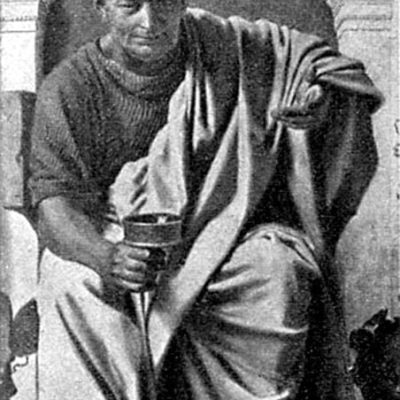Chapters
Horace was born on 8th of December 65 BCE in Apulia under the name of Quintus Horatius Flaccus. He was one of the leading lyric poets during the Augustus Era. As a son of a freedman, he acted during the most magnificent blooming period of Roman literature during the times of Augustus.
His father, who was of Venusian origin, made sure that Horace received thorough and versatile education. He studied in Rome, and since 45 BCE in Athens, where he was able to gain an insight into Greek and Latin. As an ally of the Republicans, after the Caesar was murdered, he joined up the army and, under the command of Brutus, fought against Augustus. Being a tribune of the army, he partook in the battle of Philippi in 42 BCE, from which he had to flee in order to save his life. After the amnesty for the enemies of Augustus was announced, he came back to Italy. Since he declared for the wrong side, his family assets were confiscated. Moreover, he acknowledged that his father was dead. Despite being nearly broke, he was able to purchase a position of secretary at quaestor in Rome, thereby ensuring that he would make a living and allowing him to take to poetry.
His friendship with Virgil make it possible for him to become a part of the circle of Maecenas’ friends, who afterwards introduced him to Augustus. Good relations with Maecenas encouraged him to become a part of his literary circle, wherein he met Ovid. A small mansion near the city Tibur in the Monti Sabini given by Maecenas to Horace alleviated all his carks related to finances and allowed him to dedicate himself to literary work in full. Although he was financially dependent on his noble protector, he was able to maintain his personal independence, remaining a friendship of Maecenas till the end of his days.
He remained moderate throughout his life and was not too influenced by any of the schools of philosophy – neither was he a resolute epicurean, nor a cynic or a sceptic, or a stoic. As the years went by, however, he was moving towards the stoicism. To this very day, Horace is known as a very ardent propagator of the civil virtues.
Works
- “Epodes”, 41-30 BCE – Short pieces of work themed on politics; Horace wrote them as he was impressed by the Perusine Wars – the advice to Romans is given, with the example of horrifying civils wars, that they, as the Phocians did, should leave Rome and travel to the Fortunate Isles, somewhere past the Pillars of Hercules.
- “Satires”. 40-30 BCE – Works aimed at ridiculing peoples’ flaws and weaknesses. Therein, Horace did not deride the prominent figures, nor was he a strict judge, but told the truth while laughing. They were modelled on works of Gaius Lucilius, Menippus of Gadara and stoical-cynical diatribe. At that time, also the book of iambs came out, which were meant to attack usurers, upstarts, nasty critics and feeble poets. Horace’s Satires well greatly appreciated.
- “The Odes” – These are the greatest of Horace’s achievements. These works covered a huge variety of subjects, such as religion, regale, poems to friends, poems to loves, Classical and Hellenistic themes, reflections on death and the joy of life; they were perfectly constructed when it comes to metrics. The Odes were to a great extent modelled on the poetry of Alcaeus, Sappho, Pindar and Anacreon. Because of the celebrations of the new century, Horace wrote Carmen saeculare.
- “The Letters” 23-8 BCE – They are of a philosophical essence. They touch upon the issues of poetry, particularly the letters of the 2nd tome: “The Letter to the Pisos”, also known as “Ars Poetica”. It is the essay on poetry, related mainly to drama, and translated into many languages. It was the basis of European poetry.
Horace’s literary works are regarded as the greatest achievements in the Classical Era and hugely influenced European poetry.
Death
Horace died on 27th of November 8 BCE. The death was sudden, and the poet did not leave any last will. It caused suspicions that he committed suicide by using a poison so that he could fulfil the promise once made to Maecenas: the very day of your death shall be my last day too. Those suspicions were never proved. The body of Horace was not burnt, but buried beside the tomb of Maecenas, in the garden of the friend on the Esquiline Hill (horti Macenatiani).








